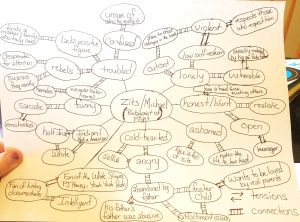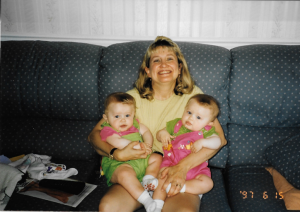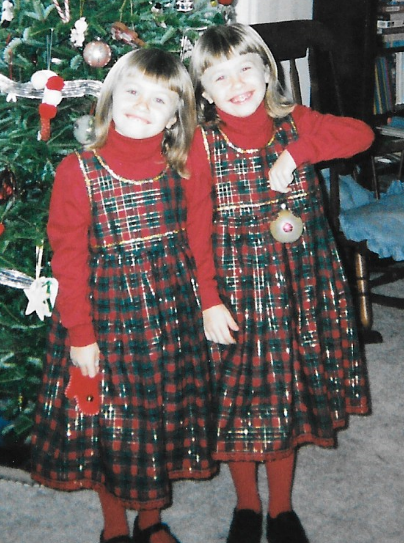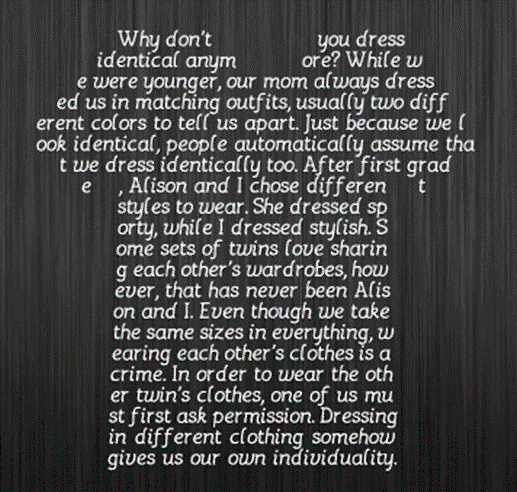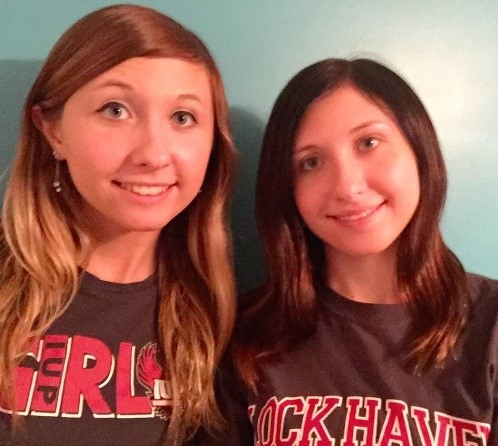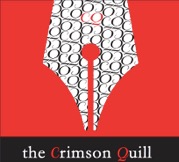Kirsten Schlorff (Choice 1: Identity and Time Travel)
Kirsten Schlorff
ENGL 121
Dr. Wender
2 November 2017
Choice 1: Identity and Time Travel
My Identity Map (top) and Zits/Michael’s Identity Map (bottom)
In the novel Flight by Sherman Alexie , the protagonist, introduced as Zits, goes through multiple transformations in which he assumes different identities. As a matter of fact, experiencing these various transformations helps Zits find his true identity by the end. In the opening chapter, Zits identifies himself as half-Native American and half-Irish, which society often sees as conflicting heritages. It is difficult for most people to see someone as both white and Indian, even though it is possible for both heritages to co-exist. However, Zits is confused and unsure about who he really is, because he doesn’t feel Irish or Indian since neither of his parents have been a part of his life for years. In fact, Zits describes himself when he said, “I’m a blank sky, a human solar eclipse” (Alexie, 5). Throughout the course of the novel, the protagonist assumes six different identities. These identities include: Zits (himself), Hank Storm, an Indian boy, Augustus Sullivan (Gus), Jimmy, and Michael.
Zits is a 15-year-old foster child, who is highly ashamed of his life, his physical appearance, and even himself in general. Zits wakes up inside the body of FBI agent Hank Storm in a motel in 1975. Hank is also a half-breed Indian, and while Zits likes Hank’s physical appearance better than his own, he also feels trapped. As Hank, he states, “I am looking at a very handsome white guy in the mirror. His hair is blonde. His eyes are blue. His skin is clear. This guy hasn’t had a zit in his whole life. And this guy is me” (Alexie, 40). Speaking on Hank’s behalf, Zits also says, “I am beautiful,” after examining himself in the mirror (Alexie, 41).
After assuming the identity of Hank Storm, Zits runs into the middle of a gigantic Indian camp, complete with thousands of real Indian tepees and thousands of real old-time Indians. Transforming into a thin and muscular 12- or 13-year old Indian boy, Zits realizes he finally has a real, loving father and family. As an Indian boy Zits says, “I have a family. A real family. A true family. I am happy for the first time in my life” (Alexie, 65).
Next, Zits awakes to the sound of a reveille, a military bugle call. Even though Zits is aware that he is a soldier, he thinks he is still his normal self. However, after being shouted at numerous times, he is introduced by a general to the troops as Augustus “Gus” Sullivan. General Mustache described Gus as, “the best Indian tracker in the entire U.S. Army” (Alexie, 84). Gus is an old soldier, who has served for at least 20 years. Revenge made Gus lead 100 white soldiers into an Indian camp and kill innocent Indians. As Gus said, “This is what revenge can do to you…We are killers.” Considering Zits is half Native-American, he said he couldn’t lead the white soldiers in to kill his own people. Zits clarifies that not all Indians are the same though, when he rhetorically asks, “But we’re not all the same kind of Indians, are we?” (Alexie, 87).
When Zits transforms into the pilot Jimmy, he finds himself flying an airplane. Zits can feel the pilot’s emotions and see his memories. Jimmy can be considered a traitor because he cheated on his wife several times. Zits compares Jimmy to his own father when he says, “Okay, so I guess that Jimmy the pilot is a dirty liar and a cheat. My Indian father was a dirty liar and a cheat. So I guess this another kind of justice. I’ve been dropped into the body of a man just like my father” (Alexie, 118). Zits also states his opinion of Jimmy stating, “Jimmy is a major-league jerk. He’s made two women weep and wail in two minutes” (Alexie, 119). After his wife, Linda, leaves him, Jimmy flies his airplane into a large lake. As the plane falls, Zits thinks about his mother, father, the people he’s loved, hated and betrayed, and those who have betrayed him. At this point in the novel, Zits conveys that betrayal is a natural human vice when he says, “We’re all the same people. And we are all falling” (Alexie, 130).
Zits experiences the most emotionally painful, yet eye-opening transformation when he assumes the identity of his father. Forcing his father to remember the day he left him, Zits realizes that his father was emotionally abused growing up and was forced to believe that “he wasn’t worth shit.” Zits’s father was afraid of becoming like his own abusive father, and that fear made him leave the hospital when Zits was born.
In the final chapters of the novel Flight, Zits opens his eyes and returns to the bank in Seattle. When he realizes he is back to his normal self, he says, “I have returned to my body. And my ugly face. And my anger. And my loneliness” (Alexie, 158). Ultimately, Zits decides not to shoot the strangers in the bank and says, “I think all the people in this bank are better than I am. They have better lives than I do. Or maybe they don’t. Maybe we’re all lonely. Maybe some of them also hurtle through time and see war, war, war. Maybe we’re all in this together” (Alexie, 158).
Zits’s new foster mother, Mary, is the first person to ever genuinely care about him and keep promises. Mary provides Zits with skin-care treatment for his acne and shows him how to properly use it, and hugs him tightly when he cries. No one has hugged Zits like that since his mother died, which makes Zits think he will finally be happy and have an almost real family. After apologizing repeatedly, he says to Mary, “My real name is Michael. Please, call me Michael” (Alexie, 181).
To conclude, Zits’s journey of transformations throughout the novel Flight helps him realize that he is in control of his own identity by providing insight into several other perspectives. Each identity somehow speaks to Zits’s confusion, yet he discovers that every person has inner conflicts and moments of confusion. Ultimately, Zits learns that an individual’s identity is defined more by his/her behavior than by his/her race or wealth. No magical identity solves every problem. Instead, each person must work hard to become someone he/she can be proud of.
This overarching theme relating to identity is still prevalent even today. Most teenagers have a hard time trying to “find themselves.” People are constantly being judged, ridiculed, and labeled by others. Many foster children remain unsure about where they came from or who their biological parents were. For instance, Sherman Alexie incorporated much of his Native American heritage and first-hand experiences in writing and creating the protagonist for this novel.
Likewise, there have been many times throughout my life during which I have wanted to be someone else rather than face my own problems. However, in college, I began to realize after facing many emotionally difficult situations that I am the only person who has control over my identity and life. I have since learned to assume responsibility for my actions and solve my own problems, rather than blaming or relying on others to help me. The week before finals during the spring semester of my sophomore year at IUP, I was raped by someone I barely knew. After crying and being distraught about the situation for several weeks, I had to decide whether to let the situation define my identity as a victim or heal and move forward as a survivor. I was judged, victim-blamed, ridiculed, and labeled as many negative things. Sometimes it felt as if no one believed me. When I realized I was the only person who had control over my identity regardless of what others were saying about me, I emerged stronger than I ever was before.

